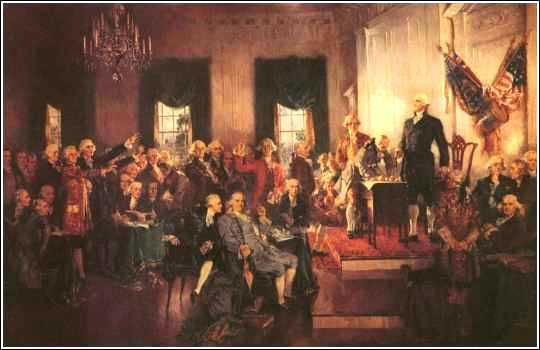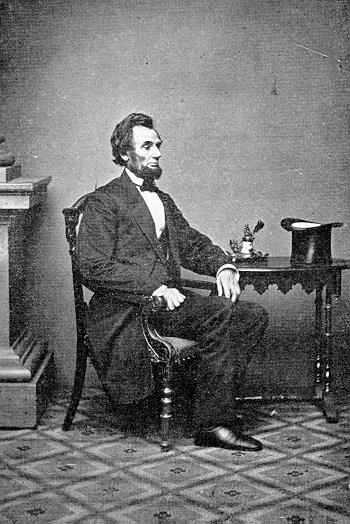With Mr. Brooks

![]()
Because I said so! (Don't you hate it when people say that?)
Learning these things will benefit you greatly, not only during this year, but throughout your life. I think it is important, as an American, to know our pledge, to learn our national anthem, and to have an understanding of important documents such as the Declaration of Independence, the Constitution, and the Gettysburg Address. Other selections, such as "Swimming Upstream", are being learned for other purposes!
Some of these things will be easier than others for you to learn. Others, like the Gettysburg Address, will offer you quite a challenge.
Additionally, each time our class learns a total of forty of the items (see chart), we will plan a fun activity to reward you for your hard work!
![]()
![]()
I pledge Allegiance to the flag of the United States of America and to the
Republic for which it stands, one nation under God, indivisible, with Liberty
and Justice for all.
Want to learn more about what the pledge means?

![]()
![]()
Juro lealtad a la bandera de los estados Unidos de America, y a la Republica que representa, una Nacion ante Dios, indivisible, con libertad y justicia para todos.
juro="huro" que="kay" nacion="nah-see-ohn" ante="ahn-tay"
Dios="dee-ohs" indivisible="en-duh-veh-see-blay" justicia="who-stee-see-uh"


![]()
![]()
The Preamble (Introduction) to the Constitution:
We the People of the United States, in Order to form a more perfect Union, establish Justice, insure domestic Tranquility, provide for the common defense, promote the general Welfare, and secure the Blessings of Liberty to ourselves and our Posterity, do ordain and establish this Constitution for the United States of America.

![]()
![]()
A selection from the Declaration of Independence:
When in the Course of human events it becomes necessary for one people to dissolve the political bands which have connected them with another and to assume among the powers of the earth, the separate and equal station to which the Laws of Nature and of Nature's God entitle them, a decent respect to the opinions of mankind requires that they should declare the causes which impel them to the separation.
We hold these truths to be self-evident, that all men are created equal, that they are endowed by their Creator with certain unalienable Rights, that among these are Life, Liberty and the pursuit of Happiness.
Learn more about the Declaration

![]()
![]()
Four score and seven years ago our fathers brought forth on this continent, a new nation, conceived in Liberty, and dedicated to the proposition that all men are created equal.
Now we are engaged in a great civil war, testing whether that nation, or any nation so conceived and so dedicated, can long endure. We are met on a great battle-field of that war. We have come to dedicate a portion of that field, as a final resting place for those who here gave their lives that that nation might live. It is altogether fitting and proper that we should do this.
But, in a larger sense, we can not dedicate -- we can not consecrate -- we can not hallow -- this ground. The brave men, living and dead, who struggled here, have consecrated it, far above our poor power to add or detract. The world will little note, nor long remember what we say here, but it can never forget what they did here. It is for us the living, rather, to be dedicated here to the unfinished work which they who fought here have thus far so nobly advanced. It is rather for us to be here dedicated to the great task remaining before us -- that from these honored dead we take increased devotion to that cause for which they gave the last full measure of devotion -- that we here highly resolve that these dead shall not have died in vain -- that this nation, under God, shall have a new birth of freedom -- and that government of the people, by the people, for the people, shall not perish from the earth.

![]()
![]()
Changing Class from Swimming Upstream
(a poem by Kristine O'Connell George):
As soon as the bell rings,
students pour out the doors,
surging down the halls
shoving, jostling, dodging,
in a roar of voices.
Pushing forward, I weave
in, out, and among
a thousand others,
feeling as if
I'm swimming upstream.

![]()
![]()
The National Anthem (words by Francis Scott Key 1780)
Oh, say can you see by the dawn's early light
What so proudly we hailed at the twilight's last gleaming?
Whose broad stripes and bright stars thru the perilous fight,
O'er the ramparts we watched were so gallantly streaming?
And the rocket's red glare, the bombs bursting in air,
Gave proof thru the night that our flag was still there.
Oh, say does that star-spangled banner yet wave
O'er the land of the free and the home of the brave?

![]()
The Bill of Rights (as translated by Mr. Brooks)
Amendment I
Congress does not have the right to tell you: how to practice your religion, what you can or cannot say, that you can't gather in peaceful groups, that you can't complain about the government.
![]()
Amendment II
You are allowed to arm yourself and maintain a militia, if you choose.
![]()
Amendment III
You do not have to have soldiers stay in your home.
![]()
Amendment IV
You may not be searched or have your things taken unless there is a proper reason to do so.
![]()
Amendment V
You may not have your life, your freedoms, or your property taken away unless there are proper reasons and procedures to do so.
![]()
Amendment VI
You have the right to have a fair trial.
![]()
Amendment VII
In certain cases you have the right to a trial by jury.
![]()
Amendment VIII
You have the right not to be punished in a cruel, unusual, or excessive manner.
![]()
Amendment IX
You have other rights, not listed in the Constitution, but guaranteed to people
who live in a free society.
![]()
Amendment X
The powers not given to the United States by the Constitution, are given to the
States, or to the people.
Learn more about the Bill of Rights
